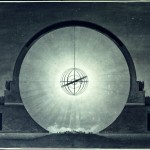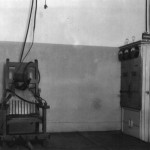The questions were reawakened in an explicit form during a ‘retreat’ I did at a Benedictine monastery, in the Eastern Townships of Quebec –a visit that my high school had organized for its senior students. It is there that I picked up a Chesterton biography of St Francis of Assisi and became hooked on his sort of poetic insights and, I now realize, facile rhetorical questions and dialectics with which G.K. Chesterton dealt with the modern world. His (and later C.S. Lewis’) way of asking religious questions are to blame for the way my obsessions were reawakened in ‘philosophical’ form. There was also two other authors, but they are so likely to be unknown in the English speaking world that I mention them only for the sake of completeness, not thinking they will mean anything to an English speaking person: André Manaranche, a French Jesuit, and Claude Tresmontant, the author of pseudo-scientific apologetic works.
I say the questions were reawakened towards the end of my teenage years, but in fact the anxiety linked to my line of questioning had never stopped bothering me, at the less articulated, emotional level. One of the shapes the questions took concerned death. Not death in the abstract, but in the very concrete form of holes dug up for tombs and the charnel house in the cemetery besides the house where my Cub Scout group met. Or, death as in going to practice my piano, in the main parlor of the nuns’ convent where I went to school, never knowing if there would, or would not, be a tomb in the parlor when I arrived (for this was where the viewing of deceased nuns’ corpses occurred, whenever a member of the community died). These were rather concrete ways to remind me that we all die, which forced me to modify my original question from why are you doing liturgy to why are you all going through life as if death is not inevitable? Far from providing me with answers as to the purpose of liturgy, it made me suspect (long before I read Freud) that this was all the expression of some vast unavoidable neurosis, co-terminal with the human condition when one was honest enough to face the truth of existence.
These questions, and the hope of finding an answer to them in the sort of terms outlined by Chesterton, Lewis, Manaranche and Tresmontant never really left me until just a few years ago. And as I said: I really wished that those questions would have left me alone for I could always sensed how neurotic they were.
Three things happened that made me change my ways.
The first one was the reading of Albert Camus as a meditation on Plato’s allegory of the cave, which made me think of conversion in a totally different way than the one to which so many in the born-again crowd reduce it to. Instead of viewing conversion as an event that occurs in the outside world, as a result of realizing we’re sinners and giving ourselves up to the Lord in some ‘religious’ sort of 12-step program, I started to see conversion as a change of viewpoint within one’s way of apprehending the world. Instead of viewing my sense of the absurd as an indictment of the possibility for any meaningfulness in the world, I started to view it instead as a sign of the existence of some transcendent reality of meaningfulness, the sort that just was not entirely coextensive with the world and which manifested itself in the world either as something lacking (in the form of what made us feel the world was meaningless) or as something present but which could not be reduced to the world’s materiality (the world’s beauty, for instance, whose very material fleetingness made it otherworldly).
The second thing that made me change my way was the reading of Jung and Jung-versed theologians. Jung has a way of telling you that just because it’s happening in your head that doesn’t mean that it’s not real calmed my obsession with finding empirical foundations for whatever faith I had, and to learn to trust that faith instead of questioning it. I stopped viewing my instincts as neurotic and started using my faith less like a question raising issue and more like a guide (Cardinal Newman’s Lead Kindly Light expressed this sentiment very well, for me). This, in turn, led me to pay more careful notice to all the Christian and non-Christian traditions that speak of the inner teacher (Augustine, Socrates) or of the ‘imitatio mariae’ so we can become, in our turn, Theotokos, by letting the word of God take roots in us and work its theogenic magic in us (Eckhart).












